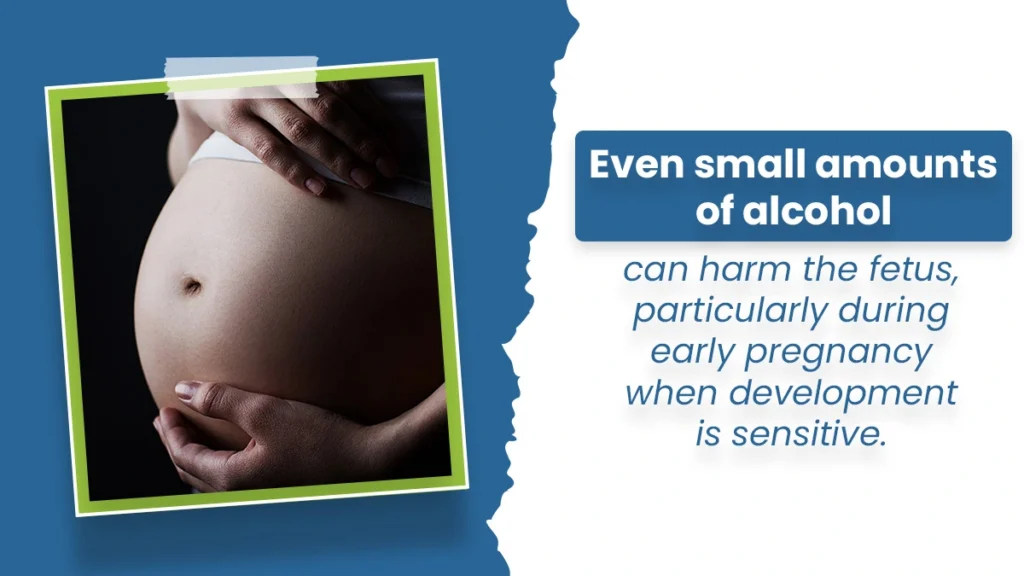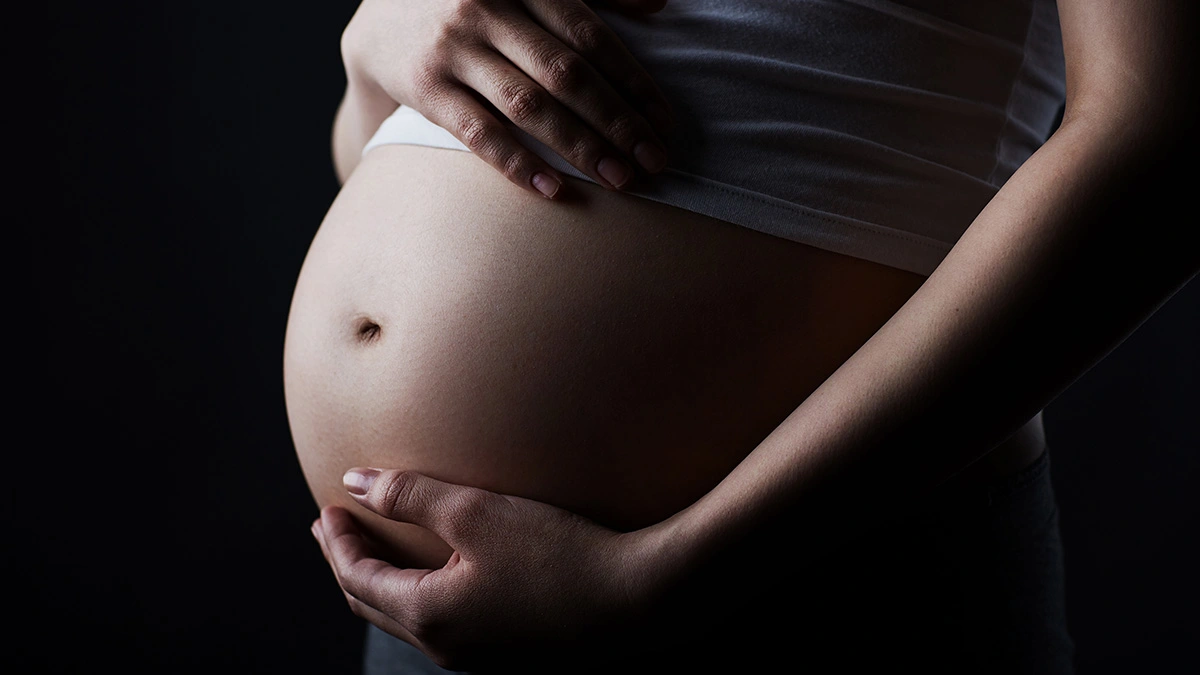Pregnancy is a remarkable journey filled with anticipation and care. When a pregnant person drinks alcohol, it can directly affect the developing baby.
This article sheds light on the effects of alcohol during pregnancy, offering insights that every expectant parent should be aware of. We will explore how alcohol travels from the mother’s body to the baby’s, detailing the potential risks. By understanding these crucial facts, you’ll be better equipped to make informed choices and prioritize the health and well-being of both the mother and the unborn child.

Key Takeaways
Drinking during pregnancy allows alcohol to reach the developing baby, posing risks to growth and development.
- Alcohol exposure in the womb can lead to FAS, causing physical abnormalities and lifelong learning and behavioral difficulties.
- The placenta can’t fully protect the baby from alcohol, raising the risk of central nervous system disorders and stillbirth.
- Even small amounts of alcohol can harm the fetus, particularly during early pregnancy when development is sensitive.
- Pregnant women should avoid alcohol, consult healthcare providers, and prioritize maternal and fetal well-being.
Don’t wait to become pregnant to stop drinking. Choose The Haven Detox-Little Rock today and take the first step towards reclaiming your life from addiction.
Science of Alcohol During Pregnancy
When pregnant women consume alcoholic drinks, the alcohol travels through their blood to the unborn baby. This journey can lead to serious problems for both the mother and baby.
How Alcohol Moves Through The Body
When a pregnant woman drinks alcohol, her body processes it much like when she’s not pregnant. Alcohol is absorbed into the blood and transported to the liver for processing. However, as the alcohol is in the blood, it is transported to different parts of the body before reaching the liver. The developing fetus doesn’t have the same capacity to handle alcohol. Even small amounts of alcohol can be harmful, with the potential to cause birth defects, growth issues, and intellectual disabilities.
Role of the Placenta in Alcohol Exposure
The placenta, a lifeline between the pregnant woman and her baby, transmits alcohol to the developing fetus. Despite its protective function, the placenta cannot prevent alcohol from reaching the baby’s bloodstream. This puts the baby at risk of harm, including the potential for central nervous system issues and a heightened chance of stillbirth.
How Alcohol Affects a Developing Fetus
Exposure to alcohol in the womb can lead to a range of developmental disabilities, collectively known as fetal alcohol syndrome (FAS). This condition can result in physical problems like low birth weight, small head size, and facial abnormalities. Beyond physical concerns, FAS can also lead to behavioral problems and learning difficulties that persist throughout life.
Seeking Support and Advice
Pregnant women should avoid alcohol entirely. It’s important to consult a doctor or healthcare provider for advice and information on maintaining a healthy pregnancy. Medical conditions, the potential for harm, and individual circumstances can vary, but the safest approach is to steer clear of alcoholic drinks. Support groups, midwives, and healthcare providers can assist in making informed choices to ensure the best possible outcomes for the pregnant woman and her unborn baby.
Dangers of Drinking During Pregnancy
When it comes to pregnancy, the effects of alcohol are far-reaching and potentially harmful. Pregnant women must understand the dangers of alcohol consumption, as it can have severe consequences.
Physical Effects
Drinking alcohol during pregnancy, especially in large amounts or through binge drinking, can lead to physical problems for the unborn baby. These problems might include low birth weight, premature birth, and even miscarriage. The alcohol passes through the placenta and umbilical cord, directly affecting the baby’s growth and development. In severe cases, babies born to mothers who drank during pregnancy might have small heads and facial abnormalities.
Neurological Effects
The brain of a developing fetus is particularly vulnerable to the harmful effects of alcohol. Even small amounts of alcohol during pregnancy can result in neurological issues that lead to learning difficulties, behavioral problems, and intellectual disabilities. These effects can extend into childhood and beyond, affecting a child’s ability to excel in school and interact socially.
Fetal Alcohol Spectrum Disorder (FASD)
Fetal Alcohol Spectrum Disorder, or FASD, is a term used to describe a range of lifelong physical and cognitive impairments that can affect a child when their mother drinks alcohol during pregnancy. There is no known safe amount of alcohol use during pregnancy, and FASD can result from even small amounts of alcohol.
The potential harm from alcohol-related exposure is highest during the early stages of pregnancy when many women might not yet know they are pregnant. Heavy drinking during pregnancy can lead to the most severe problems, including intellectual disabilities and physical abnormalities.
Studies have shown that heavy alcohol consumption can harm the baby’s brain, leading to various health problems that may affect their quality of life. It’s a good idea for pregnant women to avoid alcohol altogether and provide the proper care for their infants right from the start to ensure the best outcomes.
Guidelines and Recommendations for Expectant Mothers
Seek help and advice from healthcare providers, midwives, and partners for support during pregnancy. Following are some recommendations for expectant mothers:
- Avoid alcohol altogether during pregnancy to prevent potential harm to the infant.
- Alcohol consumption is not a safe or reliable way to terminate a pregnancy and may result in alcohol addiction.
- Alcohol can cause birth defects and intellectual disabilities; even small amounts pose risks.
- Partners should also be mindful of alcohol levels, as heavy alcohol use can impact pregnancy.
- Remember, alcohol passes through breast milk, so avoiding it while breastfeeding is best.
- FASD is a leading cause of congenital disabilities; the right care and support can lead to better outcomes.
- Pregnant women should prioritize their health and the baby’s well-being by staying away from alcohol.
Frequently Asked Questions (FAQ)
How early in a pregnancy does alcohol affect the baby?
Alcohol can affect the baby as early as the first few weeks of pregnancy when important development takes place. It’s crucial to avoid alcohol during this time to prevent potential harm to the baby’s growth and well-being.
What happens if you drink while pregnant without knowing?
Drinking alcohol during early pregnancy, even without knowing, can still pose risks to the developing baby. It’s vital to avoid alcohol altogether when trying to conceive to safeguard the baby’s health and prevent potential complications and developmental issues.
How much alcohol can one consume when one is pregnant?
Avoid alcohol entirely during pregnancy. No amount of alcohol is considered safe, as even small amounts can potentially harm the baby’s development. The best option is to abstain for the baby’s well-being.
Choose Health Today at The Haven Detox-Little Rock
If you want to start your family but are worried about your alcohol use, The Haven Detox-Little Rock is here to help. Our comprehensive services include a detox program and residential rehab, offering personalized care and support to address addiction recovery’s physical and emotional aspects. Our specialized alcoholism treatment programs promote lasting recovery. Don’t wait until pregnancy to get help. Call us at (501) 271-3342 for more information.




